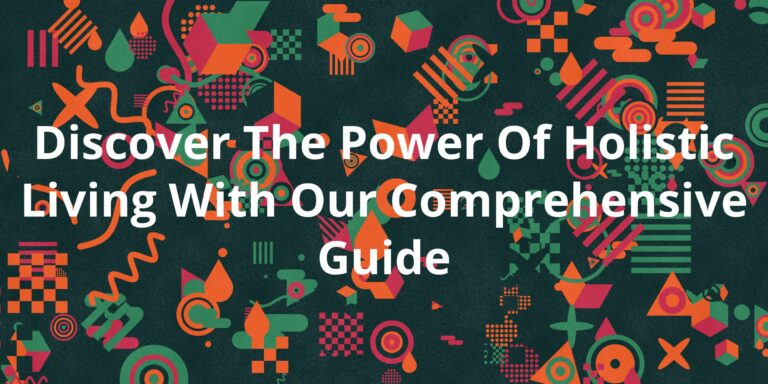Introduction:
Holistic health is a way of living that focuses on the whole person – mind, body, and spirit. It involves taking care of all aspects of ourselves to achieve overall well-being. Empowering your journey towards wholeness can be a challenging yet rewarding experience. In this comprehensive beginner’s guide, we will explore some of the key concepts and practices that can help you on your path towards holistic health.
1. Mindfulness:
Mindfulness is the practice of being present in the moment, without judgment or distraction. It involves paying attention to our thoughts, feelings, and sensations as they arise, and accepting them without getting caught up in them. Mindfulness has been shown to reduce stress, improve focus, and increase self-awareness.
Practice:
There are many ways to practice mindfulness, including meditation, deep breathing exercises, yoga, and body scans. Start by setting aside a few minutes each day to focus on your breath and observe your thoughts and feelings without judgment. As you become more comfortable with the practice, try incorporating it into other aspects of your life.
2. Nutrition:
Eating a healthy diet is essential for physical health and well-being. A holistic approach to nutrition involves eating whole, nutrient-dense foods that nourish our bodies and minds. This includes fruits, vegetables, whole grains, lean protein, and healthy fats.
Practice:
Start by incorporating more fruits and vegetables into your diet, as well as whole grains like brown rice and quinoa. Choose lean protein sources like tofu, fish, and chicken, and limit processed foods and added sugars. Experiment with different cooking methods, such as roasting, steaming, or sautéing, to bring out the natural flavors of your food.
3. Exercise:
Physical activity is essential for overall health and well-being, as it helps to improve cardiovascular health, strengthen bones and muscles, and reduce stress levels. A holistic approach to exercise involves finding activities that you enjoy and can do regularly, such as walking, swimming, or dancing.
Practice:
Find an activity that you enjoy and make it a regular part of your routine. Try to aim for at least 30 minutes of moderate-intensity exercise most days of the week. You don’t have to spend hours in the gym to reap the benefits – even short bursts of activity can make a difference.
4. Stress Management:
Stress is a natural part of life, but chronic stress can take a toll on our physical and mental health. A holistic approach to stress management involves identifying sources of stress in your life and finding ways to cope with them.
Practice:
There are many effective stress-reduction techniques, including meditation, deep breathing exercises, yoga, and journaling. Experiment with different methods to find what works best for you. It’s also important to prioritize self-care activities that bring you joy and relaxation, such as taking a bath or spending time in nature.
5. Spirituality:
Spirituality is an important aspect of holistic health, as it involves connecting with our higher selves and finding meaning and purpose in life. This can involve practices like meditation, prayer, or attending spiritual events or workshops.
Practice:
There are many different spiritual practices to explore, so find one that resonates with you. You don’t have to commit to a particular path or belief system – simply finding time to connect with your higher self can be incredibly beneficial.
Conclusion:
Empowering your journey towards wholeness is a lifelong process that involves taking care of all aspects of ourselves. By incorporating mindfulness, nutrition, exercise, stress management, and spiritual practices into our daily lives, we can achieve overall well-being and live our best lives. Remember to be patient with yourself and celebrate small victories along the way. With time and practice, you will find that living a holistic lifestyle is not only possible but fulfilling and rewarding.



